- Home
- H. P. Lovecraft
The Watchers Out of Time Page 7
The Watchers Out of Time Read online
Page 7
And in the morning, when at last I awoke after sleeping over long, I found upon my shoes, which had been clean when I went to bed, a drying black mud which was the substance of my dream! I started from bed at sight of them, and followed the tracks they had made easily enough, tracing them backwards, out of the room, up the stairs, into the hidden room on the second storey and, once there, back, inexorably, to that same bewitched corner of peculiar angle from which the footprints in the dust had led into the room! I stared in disbelief, yet my eyes did not deceive me. This was madness, but it could not be denied. Nor could the scratch on my wrist be wished out of existence.
I literally reeled from the hidden room, beginning at last vaguely to understand why my parents had been loath to sell the Peabody homestead; something had come down to them of its lore from my grandfather, for it must have been he who had had great-grandfather buried with his face downward in the family crypt. And, however much they may have scorned the superstitious lore they had inherited, they were unwilling to chance its defiance. I understood, too, why periods of rental had failed, for the house itself was a sort of focal point for forces beyond the comprehension or control of any one person, if indeed any human being; and I knew that I was already infected with the aura of the habitation, that, indeed, in a sense I was a prisoner of the house and its evil history.
I now sought the only avenue of further information open to me. The manuscript of the journal kept by my great-grandfather. I hastened to it directly, without pausing for breakfast, and found it to be a sequence of notes, set down in his flowing script, together with clippings from letters, newspapers, magazines, and even books, which had seemed to him pertinent, though these were peculiarly unconnected, yet all dealing with inexplicable events—doubtless, in great-grandfather’s eyes, sharing a common origin in witchcraft. His own notes were spare, yet revealing.
“Did what had to be done today. J. taking on flesh, incredibly. But this is part of the lore. Once turned over, all begins again. The familiar returns, and the clay takes shape again a little more with each sacrifice. To turn him back would be futile now. There is only the fire.”
And again:
“Something in the house. A cat? I see him, but cannot catch him.”
“Definitely a black cat. Where he came from, I do not know. Disturbing dreams. Twice at a Black Mass.”
“In dream, the cat led me to the Black Book. Signed.”
“In dream an imp called Balor. A handsome fellow. Explained the bondage.”
And, soon after:
“Balor came to me today. I would not have guessed him the same. He is as handsome a cat as he was a young imp. I asked him whether this was the same form in which he had served J. He indicated that it was. Led the way to the corner with a strange and extra-dimensional angle which is the door to outside. J. had so constructed it. Showed me how to walk through it…”
I could bear to read no further. Already I had read far too much.
I knew now what had happened to the remains of Jedediah Peabody. And I knew what I must do. However fearful I was of what I must find, I went without delay to the Peabody crypt, entered it, and forced myself to go to the coffin of my great-grandfather. There, for the first time, I noticed the bronze plate attached beneath the name of Asaph Peabody, and the engraving upon it: “Woe betide him who disturbs his rest!”
Then I raised the lid.
Though I had every reason to expect what I saw, I was horrified no less. For the bones I had last seen were terribly altered. What had been but bone and fragments, dust and tatters of clothing, had begun a shocking alteration. Flesh was beginning to grow once again on the remains of my great-grandfather, Asaph Peabody—flesh that took its origin from the evil upon which he had begun to live anew when I had so witlessly turned over his mortal remains—and from that other thing within his coffin—the poor, shriveling body of that child which, though it had vanished from the home of George Taylor less than ten days ago, already had a leathern, parchment appearance, as were it drained of all substance, and partially mummified!
I fled the vault, numb with horror, but only to build the pyre I knew I must gather together. I worked feverishly, in haste lest someone surprise me at my labors, though I knew that people had shunned the Peabody homestead for decades. And then, this done, I labored alone to drag Asaph Peabody’s coffin and its hellish contents to the pyre, just as, decades before, Asaph himself had done to Jedediah’s coffin and what it had contained! Then I stood by, while the holocaust consumed coffin and contents, so that I alone heard the high shrill wail of rage which rose from the flames like the ghost of a scream.
All that night the diminishing ashes of that pyre still glowed. I saw it from the windows of the house.
And inside, I saw something else.
A black cat which came to the door of my quarters and leered wickedly in at me.
And I remembered the path through the marsh I had taken, the muddied footprints, the mud on my shoes. I remembered the scratch on my wrist, and the Black Book I had signed. Even as Asaph Peabody had signed it.
I turned to where the cat lurked in the shadows and called it gently. “Balor!”
It came and sat on its haunches just inside the door.
I took my revolver from the drawer of my desk and deliberately shot it.
It kept right on regarding me. Not so much as a whisker twitched.
Balor. One of the lesser devils.
This, then, was the Peabody heritage. The house, the grounds, the woods—these were only the superficial, material aspects of the extra-dimensional angles in the hidden room, the path through the marsh to the coven, the signatures in the Black Book….
Who, I wonder, after I am dead, if I am buried as the others were, will turn me over?
THE GABLE WINDOW
I
I moved into my cousin Wilbur’s home less than a month after his untimely death, not without misgivings, for its isolation in a pocket of the hills off the Aylesbury Pike was not to my liking. Yet I moved with a sense of fitness that this haven of my favorite cousin should have descended to me. As the old Wharton place, the house had been untenanted for many years. It had fallen into disuse after the grandson of the farmer who had built it had left the soil for the seaside city of Kingston, and my cousin had bought it from the estate of that heir disgruntled with the meager living to be made on that sadly depleted land. It was not a calculated move, for the Akeleys did nothing but by sudden impulse.
Wilbur had been for many years a student of archeology and anthropology. He had been graduated from Miskatonic University in Arkham, and immediately following his graduation, had spent three years in Mongolia, Tibet, and Sinkiang Province, followed by an equal number of years divided among South and Central America, and the southwestern part of the United States. He had come home to reply in person to an offer to join the staff of Miskatonic University, but instead, he had bought the old Wharton farm, and set about to remodel it, tearing down all but one of the outbuildings, and imposing upon the central structure an even more curious shape than it had gathered to itself in the course of the twenty decades it had been standing. Indeed, the extent of these alterations was not fully apparent to me until I myself took possession of the house.
It was then that I learned that Wilbur had retained unaltered only one face of the old house, that he had completely rebuilt the front and one side, and had erected a gable room over the south wing of the ground floor. The house had originally been a low building, of but one storey, with a large attic, which had in its time been hung with all the impedimenta of the rural life in New England. In part, it had been constructed of logs; and some of this construction had been carefully retained by Wilbur, which was testimony to my cousin’s respect for the handiwork of our forebears in this country, for the Akeley family had been in America fully two hundred years when Wilbur had decided to foreswear his wanderings and settle in his native mileu. The year, as I recall it, was 1921; he had lived but three years thereafter, so tha
t it was 1924—on April 16—that I took possession of the house in accordance with the terms of his will.
The house was still very much as he left it, an anomaly in the New England landscape, for, though it still bore the marks of its ancestry in its stone foundations and the logs of its substructure, as well as in the square stone chimney which rose from its fireplaces, it had been so much altered as to seem a product of several generations. Though the majority of these alterations had apparently been made to contribute to Wilbur’s comfort, there was one change which had baffled me at the time that Wilbur had made it, and for which he never offered any explanation; this was the installation in the south wall of his gable room of a great round window of a most curious clouded glass, of which he said only that it was a work of great antiquity, which he had discovered and acquired in the course of his travels in Asia. He referred to it at one time as “the glass from Leng” and at another as “possibly Hyadean in origin,” neither of which enlightened me in the slightest, though, to tell the truth, I was not sufficiently interested in my cousin’s vagaries to press inquiries.
I soon wished, however, that I had done so, for I discovered rapidly, once I had taken up my existence in the building, that my cousin’s entire living seemed to revolve not about the central rooms of the house on the ground floor, which one might have expected, since these were appointed for maximum effect and comfort, but about the south gable room, for it was here that he kept his rack of pipes, his favorite books, records, and most comfortable pieces of furniture, and it was here that he worked on such manuscripts pertinent to his studies as he had in progress at the time that he was struck down with a coronary ailment while he was at work in the stacks of Miskatonic University Library.
That some adjustment between what had been his regimen and what was mine would have to be made, I knew; and it must be made in my favor. It seemed, therefore, that the first order of business was a restoration of the rightful way of existence in the house, a resumption of life on the ground floor, for, to tell the truth, I found myself from the beginning curiously repelled by the gable room, in part certainly because it reminded me so strongly of the living presence of my dead cousin who could never again occupy his favorite corner of the house, in part also because the room was to me unnaturally alien and seemed cold to me, holding me off as by some physical force I could not understand, though this was surely consistent with my attitude about the room, for I could understand it no more than I ever really understood my cousin Wilbur.
The alteration I wished to bring about, however, was not as easily accomplished as I had hoped it might be, for I was soon aware that my cousin’s old “den” cast an aura over the entire house. There are those who hold that houses inevitably assume something of the character of their owners; if the old house had worn any of the characteristics of the Whartons, who had lived in it for so long, it was certain that my cousin had effectively obliterated them when he remodeled the house, for now it seemed often literally to speak of Wilbur Akeley’s presence. It was not often an obtrusive feeling—only rather an uneasy conviction I experienced of being no longer alone, or of being watched, under some scrutiny, the source of which was not known to me.
Perhaps it was the very isolation of the house which was responsible for this fancy, but it came to seem to me that my cousin’s favorite room was like something alive, waiting on his return, like an animal unaware that death had intervened and the master for whom it waited would not again come back. Perhaps because of this obsession, I gave the room more attention than in fact it deserved. I had removed from it certain articles, such as a very comfortable lounging chair; but I was curiously impelled to bring them back, out of compulsions which arose from different and often conflicting convictions—the fancy that this chair, for instance, which at first proved to be so comfortable, was made for someone of a different shape from my own, and thus was uncomfortable to my person, or the belief that the light was not as good downstairs as above, which was responsible for my returning to the gable room the books I had removed from it.
The fact was, undeniably, that the character of the gable room was subtly at variance with that of the remainder of the house. My cousin’s home was in every way prosaic enough, except for that one room in the south gable. The ground floor of the house was filled with creature comforts, but gave little evidence of having been extensively used, save for that room given over to the preparation of food. In contrast, the gable room, while also comfortable, was comfortable in a different way, difficult to explicate; it was as if the room, manifestly a “den” built by one man for his use, had been used by many different kinds of people, each of whom left something of himself within these walls, without, however, any identifying mark. Yet I knew that my cousin had lived the life of a recluse, save for his journeys to the Miskatonic at Arkham and the Widener Library in Boston. He had gone nowhere else, he had received no callers, and even, on the rare occasions when I stopped at his home—as an accountant I did sometimes find myself in his vicinity—he seemed always willing that I be gone, though he was unfailingly courteous, and though I never remained longer than fifteen minutes at most.
Truth to tell, the aura of the gable room diminished my resolve. The lower floor was ample for my purposes; it afforded me a commodious home, and it was easy to put the gable room and the alterations I hoped to make in it out of my mind, to defer and postpone it until it came to seem too minor a matter to trouble about. Moreover, I was still frequently away for days and nights at a time, and there was nothing pressing I needed to do about the house. My cousin’s will had been probated, the estate had been settled, and no one challenged my possession.
All might have been well, for, with my resolve put by, I was much less aware of my unfinished plans for the gable room, had it not been for the succession of little incidents which occurred to disturb me. These were of no consequence at first; they began as tiny, almost unnoticed things. I believe that the first of them took place when I had been in possession scarcely a month, and it was such an infinitesimal thing that it did not occur to me to connect it to the later events I experienced until many weeks had gone by. It happened one night when I sat reading before my fireplace in the ground-floor living-room, and it was surely nothing more, I was certain, than a cat or some similar animal scratching at the door to be let in. Yet it was so distinct that I got up and made the rounds, from the front door to the back, and even to a little side door which was a relic of the oldest part of the house, but I could find neither cat nor trace of one. The animal had vanished into the darkness. I called to it several times, but it neither replied nor made any other sound. Yet I had no sooner seated myself again before the scratching began anew. No matter how I tried, I failed utterly to catch any sight of the cat, though I was disturbed in this fashion fully half a dozen times, until I was so upset that, had I caught sight of the cat, I would probably have shot it.
Of itself, this was an incident so trivial that no one would think twice about it. Could it not have been a cat familiar with my late cousin, and unfamiliar enough with me to be frightened away by my appearance? Indeed, it could. I thought no more of it. However, in less than a week, a similar incident took place, differing in one marked exception to the first. This time, instead of there being the clawing or scratching of a cat, there was a slithering, groping sound that sent a chill of apprehension through me, just as if a giant snake or an elephant’s trunk were moving along the glass of the windows and doors. The pattern of its sounding and my reactions was exactly similar. I heard, but saw nothing; I listened, but could find nothing—only the intangible sounds. A cat, a snake? What more?
But there was yet more, quite apart from the occasions on which the cat or the snake seemed to have returned for another try. There was the time when I heard what sounded like hoof beats, or the tramping of some gigantic animal, or the twittering of birds pecking at the windows, or the slithering of some vast body, or the sucking sounds of lips or suckers. What was I to make of all this? I considere
d hallucination, and dismissed it as an explanation, for the sounds occurred in all kinds of weather and at all hours of the night and day, so that, had there actually been an animal of any size at door or window, I should certainly have caught sight of it before it vanished into the wooded hills which rose on all sides of the house, for the fields had long since been reclaimed by new growths of poplar, birch, and ash trees.
This mysterious cycle might never have been interrupted if I had not chanced one evening to open the stair door leading up to the gable room, on account of the heat of the ground floor; for it was then, when the clawing of a cat came once more, that I realized the sound came not from one of the doors, but from the window in the gable room. I bounded up the stairs in unthinking haste, never stopping to realize that it would have been a remarkable cat indeed which could or would climb to the second floor of the house and demand entrance through the round window, which was the only opening into the room from outside. And, since the window did not open, either in whole or in part, and, since it was clouded glass, I saw nothing, even though I stood there and continued to hear, just as close by as the other side of the glass, the sounds made by the cat clawing the glass.
I raced downstairs, snatched up a powerful flashlight, and went out into the hot summer night to throw a beam of light to the side wall in which the window stood. But now all sound had ceased, and now there was nothing whatsoever to be seen but the bland house wall and the equally bland window, which looked as black from the outside as it looked like clouded white from within. I might have remained forever baffled—and often I think it would surely have been for the best had it been so—but it was not meant to be.

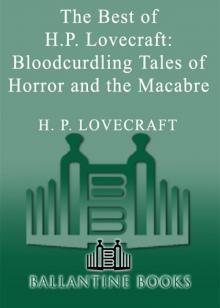 The Best of H.P. Lovecraft
The Best of H.P. Lovecraft The Definitive H.P. Lovecraft: 67 Tales Of Horror In One Volume
The Definitive H.P. Lovecraft: 67 Tales Of Horror In One Volume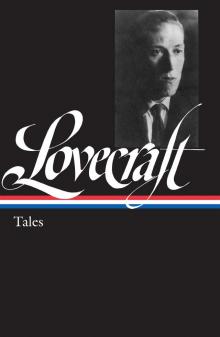 The Complete Works of H.P. Lovecraft
The Complete Works of H.P. Lovecraft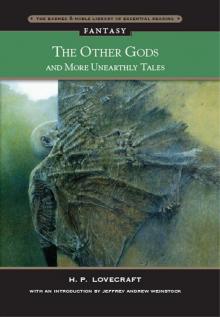 Other Gods and More Unearthly Tales
Other Gods and More Unearthly Tales Lovecraft's Fiction Volume I, 1905-1925
Lovecraft's Fiction Volume I, 1905-1925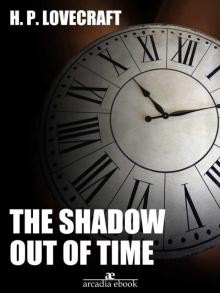 The Shadow Out of Time
The Shadow Out of Time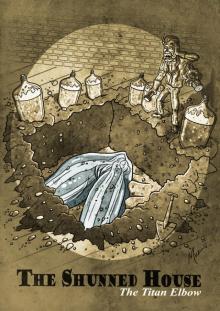 The Shunned House
The Shunned House Lovecraft's Fiction Volume II, 1926-1928
Lovecraft's Fiction Volume II, 1926-1928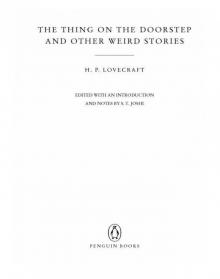 The Thing on the Doorstep and Other Weird Stories
The Thing on the Doorstep and Other Weird Stories Dream Cycle of H. P. Lovecraft: Dreams of Terror and Death
Dream Cycle of H. P. Lovecraft: Dreams of Terror and Death Great Tales of Horror
Great Tales of Horror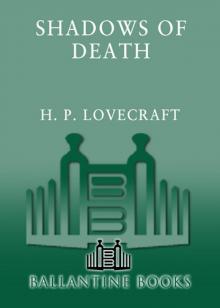 Shadows of Death
Shadows of Death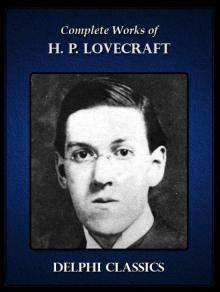 Delphi Complete Works of H. P. Lovecraft (Illustrated)
Delphi Complete Works of H. P. Lovecraft (Illustrated) Waking Up Screaming: Haunting Tales of Terror
Waking Up Screaming: Haunting Tales of Terror H.P. Lovecraft Goes to the Movies
H.P. Lovecraft Goes to the Movies The Road to Madness
The Road to Madness The Complete H.P. Lovecraft Reader (68 Stories)
The Complete H.P. Lovecraft Reader (68 Stories)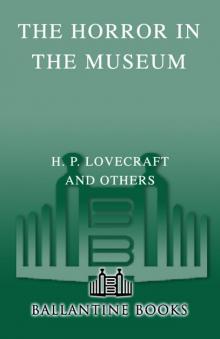 The Horror in the Museum
The Horror in the Museum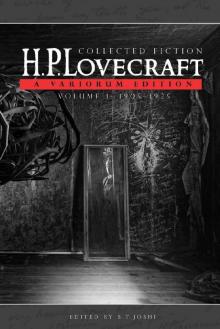 Collected Fiction Volume 1 (1905-1925): A Variorum Edition
Collected Fiction Volume 1 (1905-1925): A Variorum Edition Lovecrafts_Fiction, vol.I_1905-1925
Lovecrafts_Fiction, vol.I_1905-1925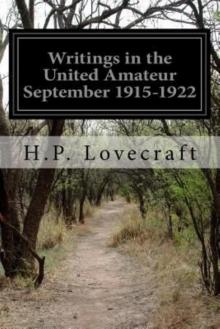 Writings in the United Amateur, 1915-1922
Writings in the United Amateur, 1915-1922 H.P. Lovecraft: The Complete Works
H.P. Lovecraft: The Complete Works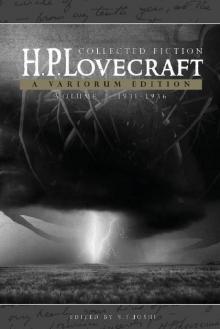 Collected Fiction Volume 3 (1931-1936): A Variorum Edition
Collected Fiction Volume 3 (1931-1936): A Variorum Edition H.P. Lovecraft: The Complete Fiction
H.P. Lovecraft: The Complete Fiction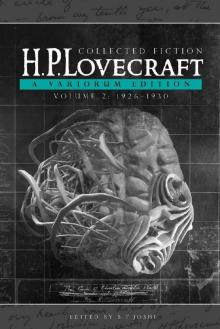 Collected Fiction Volume 2 (1926-1930): A Variorum Edition
Collected Fiction Volume 2 (1926-1930): A Variorum Edition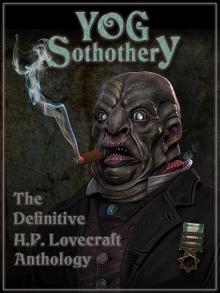 Yog Sothothery - The Definitive H.P. Lovecraft Anthology
Yog Sothothery - The Definitive H.P. Lovecraft Anthology The Complete H.P. Lovecraft Collection (Xist Classics)
The Complete H.P. Lovecraft Collection (Xist Classics)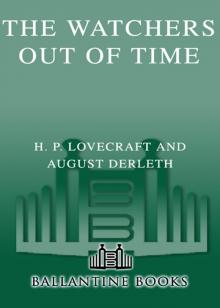 The Watchers Out of Time
The Watchers Out of Time Eldritch Tales
Eldritch Tales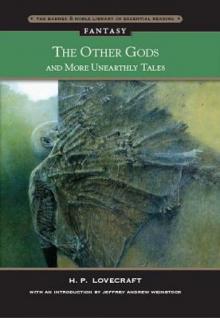 The Other Gods And More Unearthly Tales
The Other Gods And More Unearthly Tales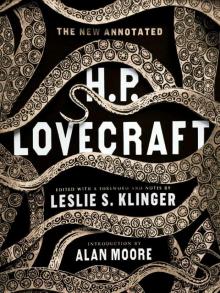 The New Annotated H. P. Lovecraft
The New Annotated H. P. Lovecraft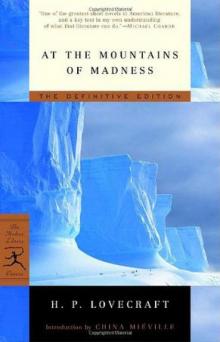 At the mountains of madness
At the mountains of madness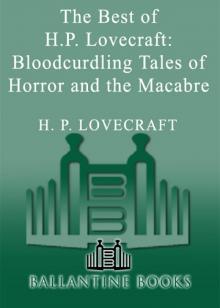 Bloodcurdling Tales of Horror and the Macabre
Bloodcurdling Tales of Horror and the Macabre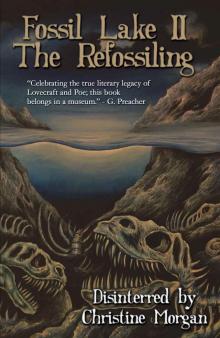 Fossil Lake II: The Refossiling
Fossil Lake II: The Refossiling Shadows of Carcosa: Tales of Cosmic Horror by Lovecraft, Chambers, Machen, Poe, and Other Masters of the Weird
Shadows of Carcosa: Tales of Cosmic Horror by Lovecraft, Chambers, Machen, Poe, and Other Masters of the Weird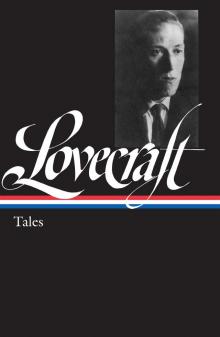 H. P. Lovecraft
H. P. Lovecraft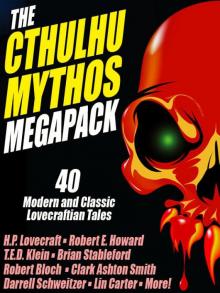 The Cthulhu Mythos Megapack
The Cthulhu Mythos Megapack The Complete H. P. Lovecraft Reader (2nd Edition)
The Complete H. P. Lovecraft Reader (2nd Edition) The Complete Fiction
The Complete Fiction Waking Up Screaming
Waking Up Screaming Transition of H. P. Lovecraft
Transition of H. P. Lovecraft![[1935] The Shadow Out of Time Read online](http://i1.bookreadfree.com/i2/04/12/1935_the_shadow_out_of_time_preview.jpg) [1935] The Shadow Out of Time
[1935] The Shadow Out of Time The Horror Megapack
The Horror Megapack